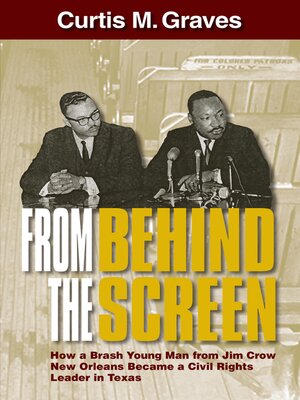From Behind the Screen
ebook ∣ How a Brash Young Man from Jim Crow New Orleans Became a Civil Rights Leader in Texas
By Curtis M Graves

Sign up to save your library
With an OverDrive account, you can save your favorite libraries for at-a-glance information about availability. Find out more about OverDrive accounts.
Find this title in Libby, the library reading app by OverDrive.



Search for a digital library with this title
Title found at these libraries:
| Library Name | Distance |
|---|---|
| Loading... |
The native creole culture of New Orleans and Louisiana is unique. Developing over several hundred years, it is a "gumbo" of former slaves, free people of color, American Indians and Europeans – all in just about any combination you can imagine. In New Orleans, regardless of the mixture, they were considered "colored." Even in the Catholic churches that allowed both races to pray, parishioners expected that they would sit in separate pews. Then there was the "screen," New Orleans' name for the gamut of "Colored Only" signs that were ubiquitous in the city. Curtis' family hid from him the most obvious signs of restrictions placed on their lives. As he became older Curtis was allowed to come to his own understanding. First attending college close to home, Curtis transferred to Texas Southern University in Houston, a large historically black college. It was a time when even more attention was being paid to the burgeoning civil rights movement. Dr. Martin Luther King, Jr. had emerged as its leader,. The young students at Texas Southern took notice. Curtis and others decided to protest in their own way – demanding equal access to public places. The first target was the lunch count ,







